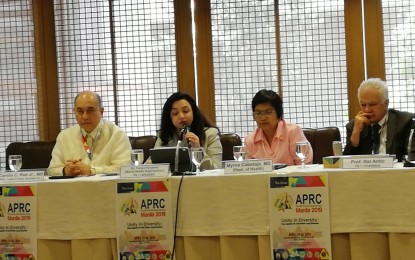
World Health Organization Global Tuberculosis Program director Tereza Kasaeva (2nd from left) says while tuberculosis is an airborne disease, it can be contracted through smoking. (Photo by Ma. Teresa Montemayor)
MANILA -- Smoking increases the risk of contracting tuberculosis (TB), an expert said on Wednesday.
"Though it's an airborne infection, there are social determinants which can activate this and if you'd look at Philippines' profile from our global TB report, you can find top five and you'll find malnutrition at the top position and second is smoking," World Health Organization (WHO) Global Tuberculosis Program director Tereza Kasaeva said in a press conference in Pasay City.
In the 2016 National Tuberculosis Prevalence Survey Findings and Country Efforts, the risk of contracting TB through smoking is at 3.3 percent among males and 1.9 among females.
Kasaeva said studies show that smoking increases the risk of contracting active TB, the risk of recurrent TB and impairs a person's response to treatment of the disease.
She also stressed that second-hand smoke likewise increases the risk of contracting TB, especially in children.
"Smoking in the Philippines is a big problem, these programs on tobacco restriction is about smoking restriction, and they should also be highlighting the risk of developing tuberculosis," she said.
According to the 2018 WHO Global TB Report, Filipinos have a poor understanding of TB as a disease, prompting the immediate need for massive public awareness campaigns and patient education sessions.
Kasaeva also encouraged Filipinos to stop discriminating against TB patients.
"Also, we would like to ask to avoid the stigma of discrimination because clearly this is a preventable and treatable disease and once patients start immediate treatment, they won't be transmitting the disease," she said.
In 2017, there were about 1.3 million TB deaths and additional 300,000 among people with human immunodeficiency virus.
At the United Nations High Level Meeting on TB in New York in September 2018, Health Secretary Francisco Duque III said the government is committed to ending TB nationwide.
He said the DOH plans to achieve this through the high-level National Coordination Committee activation, X-ray screening and rapid molecular testing and mandatory notifications by all care providers.
In May 2017, President Rodrigo Duterte has signed an executive order, banning smoking in public places nationwide. (PNA)
